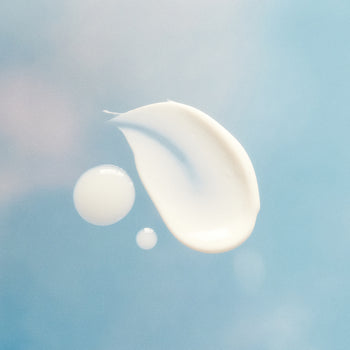
Dry Skin? Meet Your Saviors
Like any barrier, your skin's isn't something to tamper with. As the months get colder and drier, making sure your barrier remains intact is important. Why? If you damage or weaken your barrier, you're leaving your skin vulnerable.
Your barrier is comprised of oils, lipids and dead skin (yup, you actually need some of it!). The barrier helps hold onto and trap water in the skin. If you rub or burn it off, you can basically sing the N*SYNC classic "Bye, Bye, Bye" to that water. Ever get rough, dry, red or easily irritated skin? While you may have naturally sensitive skin…you also could have brought these things on yourself by messing with your precious barrier.
Here are some ways to help make sure your barrier remains strong:
1. Change your routine with the seasons.
When it’s hot and humid, a thicker cream is probably the last thing you want to reach for. In the winter? Might be a good idea. Moisturizers that have high amounts of ceramides, lipids and feel richer in texture will help keep your barrier protected.
If you're prone to breakouts, patch test and opt for brands that don't have heavy occlusives like waxes and butters or anything that feels rich or greasy. If you have chronically dry skin (flaky, easily irritated, feels itchy or looks scaly), a heavier cream will be your savior.
2. Reinforce hydration
You have probably heard a lot about hyaluronic acid. It is hugely popular in skincare and the reality is hyaluronic acid is great at plumping up your skin. We have a new term for you though, glycerin. Glycerin is a saint when it comes to dehydrated skin.Glycerin is naturally found in the top layers of your skin that need the most hydration, and is well tolerated amongst most skin types. It is in a lot of your products already. Instead of looking for humectants like hyaluronic acid (reminder; humectants are water-loving ingredients that draw and keep water close to the skin), look for glycerin and see how your skin likes it.
Use a moisturizer over any “hydrating serums.” While Glycerin is great at drawing moisture close to the skin, because it is water, it'll eventually evaporate if you don't put some kind of oil or occlusive over it.
If you're acne prone, look for moisturizers with plant oils or even some kinds of silicones.
3. Practice safe exfoliation
While exfoliation feels great, it can strip your precious oils from your skin. It is good for you in the sense that it can get rid of excess skin that blocks your skincare products from sinking in but too much of anything is not helpful. This means you need to find a balance.
Generally speaking, you don't want to exfoliate more than 1-2 times a week, especially if the product you're using to do so is strong. Also, if you have drier skin with no blackheads or closed comedones (whiteheads), you really have no need for salicylic acid (BHA) that can further dry out your skin.
For very sensitive skin or very dry skin, that’s been compromised, look for a PHA (polyhydroxy acid) or a lactic acid and always go low and slow.
4. Keep wearing SPF
As long as there’s visible light during the day, even on cloudy afternoons, there’s UVA. While you don't have to be as tyrannical about re-application in the winter as you would in the summer, keep up the good habit of practicing safe suncare.
5. Maintain good habits
Sleep, eat foods that make you feel good, and say nice things to yourself.
Before you douse yourself in glycerin enriched serums, maybe try drinking some water, using a humidifier and trying not to take searing hot showers (they can strip the skin). Check in with your sleep schedule. Your habits matter as much as your skincare products, if not more, so just a reminder that a baptism in beauty products is not always the right answer.
Lastly, be nice to yourself. Say nice things to your skin. For starters, you're Dieux-ing great.







